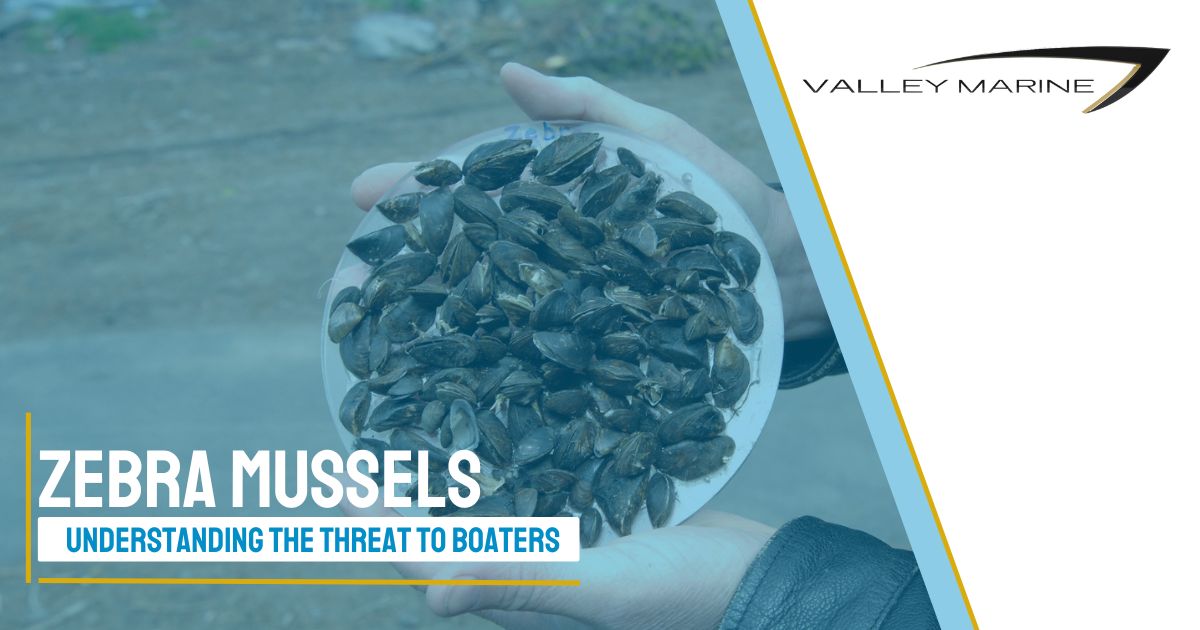Zebra mussels are small freshwater mollusks that are native to Russia and Ukraine. They are filter feeders, consuming small particles of food such as plankton, algae, and bacteria. First found in the Great Lakes region in the 1980s, they have now spread throughout the US.
They are called “zebra mussels” because of the striped pattern on their shells.
Problems for Boaters
Boaters are greatly impacted by zebra mussels as they attach themselves to their hulls, engines, docks, pipes, and propellers.. This reduces the efficiency of the boat’s propulsion system and increases fuel consumption, making it more expensive to operate. They can also clog water intake and cooling systems, potentially causing damage to the engine.
Zebra mussels’ sharp shells can scratch or damage boats and jet skis when travelling in areas with many of them.
They reproduce quickly, which leads to dense populations on boats, making it hard to remove them without causing damage.
Environmental Impact
Zebra mussels are a major threat, as their presence can disrupt the ecosystem of a body of water. They outcompete native species for food and habitat, leading to the decline of aquatic plants and animals.
As filter feeders, they can consume large amounts of plankton which has a ripple effect on the entire food chain. This leads to a decrease in populations of other aquatic species that rely on plankton as a food source.
This disruption can have direct implications as fewer fish or plant life may be available for consumption or recreation.
Prevention Measures
Boaters should clean and dry their equipment before moving it to another body of water to stop zebra mussels from spreading. This includes the boat hull, propellers, and any other equipment that may come into contact with water.
Boaters should also look for any visible zebra mussels on their equipment and discard them properly. Additionally, some states may require a boat inspection for zebra mussels before launching in a new body of water.
Boaters must clean and dry gear, take out any zebra mussels, and be aware of local laws prior to transferring equipment to another waterway to avoid zebra mussels’ spread.
Removing Zebra Mussels from Your Boat and Trailer
If you suspect that your boat or trailer has been contaminated with zebra mussels, it is important to remove them as soon as possible. This is important to prevent the spread of zebra mussels to other water bodies and to avoid the potential damage that they can cause to your boat or trailer.
One method to remove zebra mussels is to use a stiff brush and hot water. This method works well for removing mussels that are attached to the surface of your boat or trailer. Start by removing as much of the visible mussels as possible using a stiff brush. Next, rinse the boat or trailer with hot water (at least 140°F) to remove any remaining mussels.
Another way to remove zebra mussels is by using specialized cleaning solutions. There are various cleaning solutions available that are specifically designed to remove zebra mussels. These solutions can be applied to the boat or trailer and left to sit for a certain period of time before rinsing off.
It is important to note that while zebra mussels may seem harmless at first glance, they can have a significant impact on both boater’s experiences and the environment. It is essential to be proactive and take the necessary precautions to prevent their spread.
Whether it’s Malibu, Southbay, Axis, Cobalt, or Boston Whaler, Valley Marine is ready to help get your boat in top-notch shape today. Need some help with your boat service? Contact Valley Marine’s award-winning team of marine technicians for in-shop or on-location boat service today!
